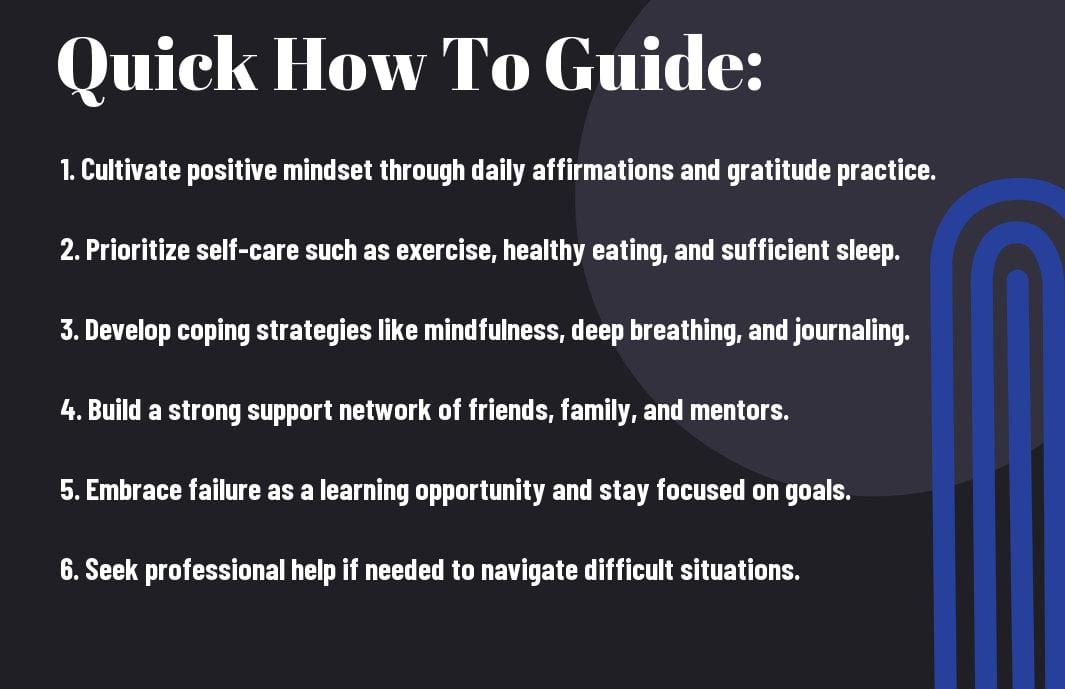This comprehensive guide will research into the art of total mental resilience, equipping you with the tools to build unwavering strength and conquer any challenges life throws your way. Discover powerful strategies to enhance your mental toughness, manage stress, and overcome obstacles with grace and determination. Whether you’re facing setbacks in your career, relationships, or personal growth, this guide will empower you to thrive in the face of adversity and emerge stronger than ever before. Embrace the journey towards total mental resilience and unlock your full potential today.
Key Takeaways:
- Develop a growth mindset: Cultivating a belief in your ability to grow and learn from challenges is imperative for mental resilience.
- Practice self-care: Taking care of your physical and mental well-being through activities like exercise, meditation, and proper nutrition can help build resilience.
- Build a support system: Surrounding yourself with a supportive network of friends, family, or professionals can provide the encouragement and assistance needed to overcome obstacles.


Factors Influencing Mental Resilience
Any individual’s mental resilience is influenced by various factors that play a crucial role in shaping their ability to overcome challenges and setbacks. Understanding these factors is necessary for cultivating strength and resilience in the face of adversity.
Genetic and Biological Factors
Factors such as genetics and brain chemistry can have a significant impact on an individual’s mental resilience. These biological factors can determine how a person responds to stress, processes emotions, and copes with difficult situations. Assume that these factors are foundational elements that contribute to one’s overall resilience.
Environmental and Social Factors
Factors like family support, peer influence, and access to resources can also shape an individual’s mental resilience. The environment in which a person grows up, the social connections they have, and the level of support they receive can greatly impact their ability to bounce back from challenges. Perceiving these influences can help individuals understand the external factors that contribute to their resilience.
If an individual is raised in a supportive and nurturing environment, they are more likely to develop strong coping mechanisms and resilience skills. On the other hand, individuals who face adversities such as trauma, neglect, or lack of social support may struggle to build resilience. Perceiving these environmental and social factors is necessary for enhancing one’s mental resilience.
Tips for Building Resilience
Now, building mental resilience is an imperative skill in overcoming life’s challenges and setbacks. It requires a combination of strategies and practices that can help you bounce back from difficult situations and emerge even stronger. The key is to proactively work on strengthening your mental muscles to handle adversity effectively.
Cultivating a Positive Mindset
Now, cultivating a positive mindset is crucial in building resilience. By focusing on the good in every situation, you can reframe challenges as opportunities for growth. Practice gratitude, positive self-talk, and optimism to boost your mental resilience. Keep in mind, challenges are inevitable, but how you perceive and respond to them makes all the difference.
Developing Healthy Habits
Clearly, developing healthy habits is key to enhancing mental resilience. Regular exercise, a balanced diet, quality sleep, and stress management techniques can significantly impact your ability to bounce back from setbacks. Plus, engaging in activities that bring you joy and fulfillment can help maintain a positive outlook during tough times. Prioritizing self-care is not a luxury but a necessity for building long-term resilience.
The path to building mental resilience is not always easy, but with dedication and practice, you can cultivate the strength to face any challenge that comes your way. Keep in mind, resilience is not about avoiding stress but about adapting and thriving in the face of adversity.
How-To Strategies for Overcoming Challenges
Embracing and Adapting to Change
Many times, we face challenges due to unexpected changes in our lives. It’s crucial to embrace change as a natural part of life and learn to adapt to new circumstances. By accepting change with an open mind and a flexible attitude, you can navigate through challenges more effectively.
Stress Management Techniques
You need to develop effective stress management techniques to overcome challenges. One powerful technique is practicing mindfulness through meditation or deep breathing exercises. These techniques can help you stay grounded and focused, allowing you to approach challenges with a clear mind and a calm demeanor.
To effectively manage stress, you can also incorporate regular physical exercise into your routine. Exercise not only helps reduce stress levels but also improves overall mental well-being. Additionally, finding support from friends, family, or a therapist can provide you with valuable coping strategies and perspective during challenging times.
Maintaining Your Resilience
Continuous Personal Development
Your journey towards total mental resilience does not end once you have built a strong foundation. Continuous personal development is crucial to maintaining your resilience. You must consistently strive to learn and grow, whether through acquiring new skills, furthering your education, or seeking personal growth opportunities. Embrace challenges as opportunities for growth and never settle for staying stagnant in your personal development journey.
Building a Supportive Network
Network plays a vital role in sustaining your mental resilience. Surrounding yourself with a supportive network of friends, family, mentors, and like-minded individuals can provide you with the encouragement and strength you need during tough times. Make an effort to nurture these relationships and seek support when faced with challenges. Keep in mind, you are not alone in your journey towards building mental resilience.
Understanding the importance of having a supportive network can make a significant difference in your ability to overcome challenges and stay resilient. A strong support system can offer different perspectives, emotional support, and valuable guidance when you need it the most. Don’t underestimate the power of a supportive network in helping you thrive in the face of adversity.
To wrap up
Presently, building total mental resilience is necessary in overcoming life’s challenges. By focusing on self-care, cultivating a growth mindset, practicing mindfulness, seeking support, and embracing adaptability, individuals can strengthen their mental resilience. This holistic approach enables us to bounce back from setbacks, navigate through adversity, and thrive in the face of challenges. Building mental strength is an ongoing journey that requires courage, determination, and practice. By actively engaging in these strategies, individuals can develop the resilience needed to overcome any obstacle that comes their way. Do not forget, resilience is not about avoiding difficulties, but about facing them head-on and emerging stronger on the other side.
FAQ
Q: What is total mental resilience?
A: Total mental resilience is the ability to withstand and bounce back from adversity, challenges, and setbacks in a healthy and constructive way. It involves developing coping strategies, positive thinking patterns, and emotional strength to navigate life’s ups and downs with grace and determination.
Q: How can I build mental strength and resilience?
A: Building mental strength and resilience requires a combination of self-awareness, adaptability, and mindset shifts. Some effective strategies include practicing mindfulness, cultivating a growth mindset, setting realistic goals, seeking support from others, and learning from past experiences. Developing a strong support network, maintaining a healthy lifestyle, and engaging in activities that bring joy and fulfillment can also contribute to greater mental resilience.
Q: Why is mental resilience important?
A: Mental resilience is crucial for overall well-being and success in life. It helps individuals navigate stress, overcome obstacles, and cope with uncertainties effectively. People with high levels of mental resilience are better equipped to handle challenges, maintain a positive outlook, and bounce back from failures. Cultivating mental resilience not only enhances mental health but also promotes personal growth, emotional intelligence, and long-term success in various aspects of life.




